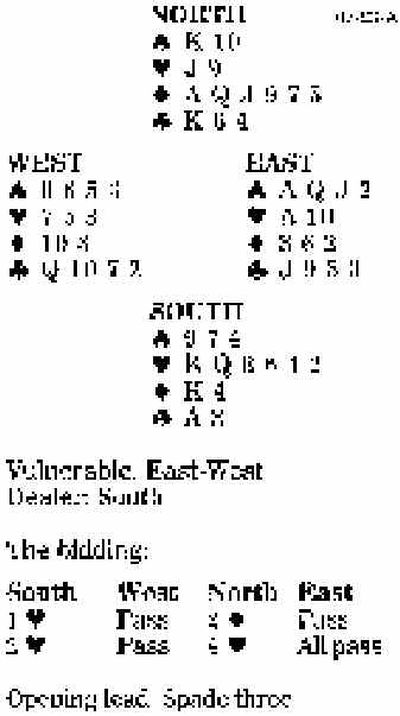Bridge

Today’s deal is a very old variant on a theme beloved by experts – and also by bridge-column writers. With that rather cryptic hint, put yourself in the East seat and see if you can work out what line of defense you would like to pursue here to try to set your opponents’ four-heart contract.
On the opening lead of the spade three, declarer plays dummy’s king and you take your ace. At this point, all that you know about the hand is that West has no more than four spades. Also, the auction strongly suggests that your partner has no more than a couple of points, since if declarer has an opening bid, all that is left outstanding is at best a king. An optimist would nonetheless cash the spade winner and lead a club. Can you do better?
Well, if partner has the diamond king, you have no chance. What if the actual lie of the cards is as shown? It’s hard to see, but there IS a defense. What you must do is to play back a low trump at trick two, threatening to win the heart ace and cash two more spade winners as soon as dummy is out of trumps. The play may look peculiar, but surprisingly there is now nothing declarer can do. If he plays trumps, you simply cash out. If he plays on diamonds, he can pitch one spade loser on the third diamond, but partner ruffs in and lets you cash your two major-suit winners.
Bid with the aces
South holds:
| “A Q J 2 | |
| “A 10 | |
| “8 6 2 | |
| “J 9 5 3 |
| South | West | North | East |
| 1 “ | Pass | 1 “ | Pass |
| 1 “ | Pass | 2 “ | Pass |
| ? |
Answer: Bid two hearts. The two-diamond call is fourth-suit forcing, asking you to describe your hand. Since you have no extra black-suit shape to show and no diamond stop, you should give preference to hearts on a doubleton – and try not to sound too pained as you do so!